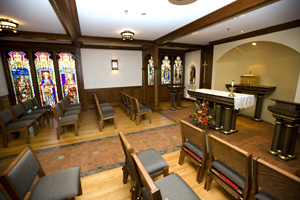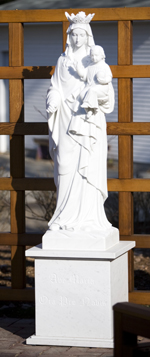The University of St. Thomas Center for Catholic Studies will dedicate and bless its expanded and renovated new home, Sitzmann Hall, at ceremonies today, Nov. 30.
The just-completed $3.9 million expansion has effectively doubled the amount of usable space of the hall and has given the nation's oldest and largest Catholic studies program new gathering and classroom spaces, offices, larger chapel, outdoor garden and Marian shrine, and other facilities that are all accessible to those with disabilities.
The expansion was needed to accommodate the program's steady growth since its 1993 founding. "When we started the program 16 years ago, it was the first of its kind and we had no idea how quickly it would grow," explained Dr. Don Briel, the center's founding director and holder of the Koch Chair in Catholic Studies.
Because of space limitations, Monday's dedication ceremony is by invitation only. Archbishop John Nienstedt and St. Thomas president Father Dennis Dease will concelebrate a 10 a.m. Mass. Speaking will be Briel, benefactor Eugene Sitzmann, the center's advisory board chair Jim Gearen, and Kaitlyn Lahti, a senior active in Catholic studies programs.
All are welcome to attend an open house at Sitzmann Hall that will be held from 2 to 4 p.m. Tuesday, Dec. 8, the feast of the Immaculate Conception. The open house will include tours and refreshments.
Today the university enrolls about 300 undergraduates who are majoring or minoring in Catholic studies, and another 80 students pursuing master's degrees.
In addition to its academic programs, the center is home to the John A. Ryan Institute for Catholic Social Thought; Terrence J. Murphy Institute for Catholic Thought, Law and Public Policy; Joseph and Edith Habiger Institute for Catholic Leadership; and the interdisciplinary journal, Logos.
The center was housed in Briel's Aquinas Hall office from 1993 to 1998, when it moved to a St. Thomas-owned home at 2057 Portland Ave. Five years later, in 2003, it moved to its present location on the northeast corner of Cleveland and Summit avenues, directly across the street from the university's O'Shaughnessy-Frey Library Center.
Sitzmann Hall, a Georgian Revival building, began life in 1927 as a single-family home. It became a residence for St. Thomas Academy high school students in 1943, and from 1946 to 1988 it served as the headquarters for St. Thomas' Department of Music. During the 1990s, it was home to the St. Thomas Conservatory of Music.
The building received a new interior, a new purpose and a new name in January 2003 when it became known as Sitzmann Hall and home to the Center for Catholic Studies. For the first time, it allowed all of the center's faculty and staff members to work in the same campus location. It was named in honor of Eugene and Faye Sitzmann for their support of the center.
With continued growth of Catholic studies programs and students in recent years, however, it became clear that Sitzmann Hall would need to be expanded. With support from major benefactors, especially the Sitzmanns, Richard and Maureen Schulze, David and Barbara Koch, Jim and Mary Gearen, Joe and Theresa Lahti, and Rich and Lisa Anderson, construction began on May 1. The center's faculty and staff returned to their renovated home at the end of October.
A new, four-level addition to the north side of the structure is being named the Schulze Wing in recognition of a $2.5 million commitment to Catholic Studies from Richard and Maureen Schulze.

The new chapel in Sitzmann Hall is named in honor of Albertus Magnus, a teacher of St. Thomas Aquinas.
The ground floor of the building has a reception area, common room for meetings, kitchen, director's office, sacristy and the new Albertus Magnus Chapel. "A teacher of St. Thomas Aquinas, Albertus Magnus remains a highly respected Catholic intellectual who was known for his interdisciplinary scholarship, an approach that lies at the heart of our Catholic studies programs," Briel said.
The chapel features stained-glass windows that once were used in a Catholic church in Massachusetts. The new chapel can accommodate as many as 50 worshippers, about three times as many as before.
The lower or basement level of the hall is dedicated to student use and gathering spaces. In addition to break rooms, it has a library, study area, a computer lab, and a graduate-student center. The third and fourth floors, meanwhile, include class and seminar rooms, a total of 14 offices, and a student work room.
A new elevator will make all four levels of Sitzmann Hall accessible to those with disabilities. Previously, only the main level was accessible.

This marble statue of the Blessed Virgin Mary was recently carved in Italy and is now home in a landscaped terrace on the north side of Sitzmann Hall.
The landscaped grounds behind Sitzmann Hall feature a new, white-marble statue of the Blessed Virgin Mary, recently carved in Italy, and a terrace with a wooden pergola and teak benches. Vines planted on the pergola's pillars will provide shade in the summer.
"The renovations were designed to provide gathering and meeting spaces that will encourage formal as well as informal interaction among students and faculty," Briel said. "We are extremely pleased with our new home and grateful to those who have helped make it possible; it will serve us well for many years to come."
As the first and largest of the 70 Catholic studies programs now at U.S. colleges and universities, the St. Thomas Center for Catholic Studies has attracted widespread attention as well as students from throughout the country.
Noting that the St. Thomas program has achieved "national significance," Peter Casarella of De Paul University's Department of Catholic Studies called it "the first fully developed program of its kind and remains a flagship for Catholic studies in North America."
“The significance of the work of Center for Catholic Studies at the University of St. Thomas goes far beyond the boundaries of the campus," commented Francesco Cesareo, president of Assumption College. "The center has become a national resource for institutions of Catholic higher education who are seeking ways to cultivate the Catholic intellectual tradition on their campuses. … The center reminds us of the important role that Catholic universities can play in the life of the church, truly becoming the place where the church does its thinking.”






